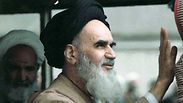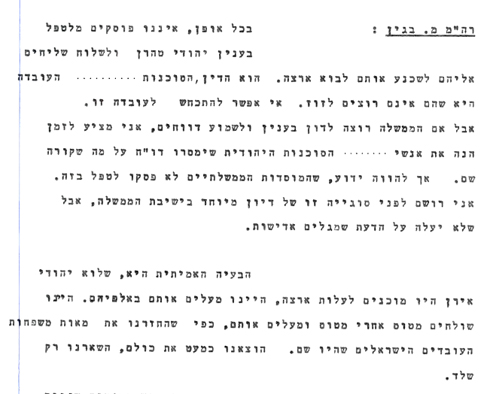
'You have to leave quickly': The Iranian Revolution through the eyes of Israelis who were there
State Archives release top secret correspondence between Jerusalem and the diplomatic mission in Tehran in the run-up to the revolution
"The shah is remote, disconnected, astray. The feeling is that he is resigned to his fate," a 1978 report from the Israeli ambassador in Tehran, Uri Lubrani, painted a bleak picture of an Iranian leader staring at revolution.
Lubrani spoke with then foreign minister Moshe Dayan about his meeting with the shah, just months before the Islamic revolution, and Ayatollah Khomeini's takeover of the country.
Thirty-five years on, Israel's State Archives have opened their vaults, revealing documents and telegrams describing the chain of events surrounding the Iranian Revolution, from Israel's perspective.
The material, which was released Wednesday, shows that before 1962, no one in Israel had heard of the religious cleric from the city of Qom who would one day take over the country. The first time he is mentioned in Israeli correspondence, after attacking the "Zionists in Iran," his named is spelled out in Latin capital letters, to help officials pronounce the name.
"In the city there is a common appearance of a poster saying that reforms, such as women's right to vote and the distribution of land, were caused by the Zionists in Iran. For your advisory," the telegram said.
The Shiite religious leader captured the attention of his followers using unsympathetic statements against the shah, the US and Israel. Quickly enough, however, Israeli officials started writing his name in Hebrew as his name became more and more familiar to them.
'The regime will fall in five years'
On June 9, 1963, the Israeli Embassy in Tehran reported that there were riots "against the shah and the reforms of the government," during the holiday of the Day of Ashura. Protesters called for the destruction of Israel, and chanted "Impure Israel - Go home."
The leader of the riots, the telegram said, was the "religious fanatic Khomeini." And after he was arrested in the protest, his grandeur only grew amongst his followers. Subsequently, there were protests in the streets calling for his release. He was transferred to house arrest, and just months later he returned to Qom, inciting his mass of believers.
"When Khomeini was released he bought for himself even greater admiration amongst the masses and the illiterates, especially merchants from the bazaars and those in the holy cities," the Israeli representatives said at the end of November 1963. "Khomeini has turned into a hero that has succeeded in dictating terms to the authorities. The weak and cowardly prime minister has tried everything in order to reach out to him and neutralize him." The diplomats also attached to the telegram a translation of one of Khomeini's posters where he blames the authorities for selling Iran to the imperialist Americans.
After his expulsion to Iraq in November 1964, Israeli officials stopped reporting about Khomeini's activities, until the eve of the revolution. During that 13-year period, Persian-Israeli relations flourished. But 1975, the shah's era was already seen as coming to a definite end. Two years later, in December 1977, Khomeini issued a religious decree banishing the shah.
In June 1978, ambassador Lubrani described the daily protests against the government, and said that the regime was bound to fall in five years.
"The unrest that we're witnessing is coming from a lack of satisfaction, which is felt by all, from the high-ranking secretaries to the masses. The course of protestation against the shah is picking up speed, and there is no way back and it will eventually bring the downfall of the regime and a radical change in Iran."
Lubrani also warned of what it would do to Israel.
"The significance of what it will do to Israeli-Iranian relations is severe." The supply of crude oil, the cooperative security projects and the commercial relations, the ambassador said, "will be damaged by the fall of the regime and the Jewish community will be one of the first destinations for harassment."
In September 1978, Lubrani had a private audience with the shah just before he returned to Israel at the end of his diplomatic mission. Lubrani couldn't help but notice how severe the shah's situation was.
"His mood is gloomy, he barely could smile. Grouchy and reflective. I asked him where he thought these developments would lead. He answered by shrugging his shoulders, he didn't have any idea. He said it was important that the government operate as usual and fulfill the will of the nation."
The ambassador let the Persian leader know about the fears within the Jewish community after seeing so many anti-Semitic posters throughout the protests.
"He was silent for a moment, and then said that it's important that the Americans understand the situation, and if not, they should tell the Russians that they're giving up on Iran. 'You have to explain them that.' I said that for all I know that is what we're doing."
Lubrani summed up the meeting with harsh words: "He's not the same man that we once knew, remote, sometimes astray. There's no doubt that the man is undergoing a nightmare. He is filled with fear and isn't sure about the future, and what's most worrying is the feeling that he's resigned to his fate."
A month later, in October 1978, Khomeini was expelled from Iraq and found refuge in Paris. Israeli representatives in the French capital reported that he had no restrictions placed on him.
"It's clear to Khomeini and those around him that they're not allowed to protest at the Champs-Élysées," ambassador Mordechai Gazit wrote. "When he came to France, the French president looked for the (Iranian) ambassador, and when they couldn't find him they sent (the French president) a message saying Khomeini had come to France as a tourist."
During Khomeini's stay in Paris, an Israeli security guard at the embassy in Iran said that the shah's security forces reported that Palestinian terrorists were training Iranian students but "foreigners and/or Israelis are not the target, rather they are trying to bring down the shah's rule."
By December 1978, the reality in Iran had begun to seriously deteriorate. The Israeli embassy reported that shops had been closed and gunshots had been heard from time to time, and there were attacks on police stations and citizens were breaking the curfew that the shah had imposed. Hundreds of thousands poured into the streets to protest.
The embassy understood that the end was near. During a four-day period of martial law, Israelis in Iran were asked to stay in their homes. "These days were met with lots of irritation and telephone calls," said a telegram sent to Jerusalem describing the security detail for Israeli institutions in Iran. In a document classified as top secret, a senior member of the Foreign Ministry described Khomeini's grip and negative influence on Iranian-Israeli relations.
"The extreme religious leader Khomeini's remarks in regards to the Israeli issue have turned scathing as of late. His view that Israeli soldiers are helping the shah is well known, and that Israelis are coming to Iran to replace the striking oil industry workers, and therefore their blood is permissible (to shed)."
'They don't want to move'
The biggest concern in Israel was the plight of the 80,000-large Jewish community.
"Have we made an effort to bring them here?" the minister Zevulun Hammer asked in a government meeting on January 7, 1979. "Surely is that not the reason the State of Israel was established?"
Then prime minister Menachem Begin responded that the issue was never off his government's agenda.
"The fact is that they don't want to move. If the Jews of Iran were ready to move to Israel, we would bring them here in the thousands," he said. "We would send plane after plane to bring them here just as we did to return the hundreds of Israeli workers and families who were there. We took out almost everyone, we only left a skeleton."
On January 16, 1979, the shah's regime came to an official end, and he and his family left Persia. Just week later, on February 1, the wheels of Khomeini's plane touched down and brought the religious leader back home after years of exile.
"Khomeini landed this morning in Tehran to a reception that was estimated from half a million to two million people," the Israeli Embassy reported. The telegram's message steadily got worse.
"The crusade against foreigners, with the US and Israel on top, will continue in attempt to drive them out. We must also assume that El Al will be forced to stop operating there soon. And almost certainly Islamic law will be made more rigid in the coming days."
The masses started taking over buildings and foreign property, and the Israelis were almost forced to exchange blows with the protesters.
"Be advised that the break-in to a building to what the news agencies reported today as the Israeli commercial representative office was a break-in to the courtyard of the embassy and outer reception room," a frightening telegram read. "There were no injuries, and if you are asked about the future, say that you don't know."
The soon-to-be abandoned embassy building was later handed over to members of the Palestine Liberation Organization. Yasser Arafat even came to Tehran to talk with Khomeini. An assortment of intelligence from the Israeli Foreign Ministry quoted Khomeini from open sources, saying that the Iranian army would fight Zionism, and that the Palestinian people would emerge victorious because there was no room for Zionism or the Israeli Embassy in Tehran, and that "Israel would no longer receive Iranian oil."
Rescuing the 'skeleton'
The "skeleton" that was left behind, according to Begin, quickly fell into trouble, and Israel asked the US to help remove its people. A telegram, titled, Rescuing our People from Iran, described the rescue attempts.
"The US Embassy in Tehran has orders to do all that it can in order to help rescue our people. The instructions are that they will try to fly them out as the No. 1 priority. It's necessary to note that as of now the Americans do not, repeat, do not have encrypted means of communication. Care will be taken not to use open communication with our people in all that is related to their departure."
Irag Takiza, an official in the Iranian Foreign Ministry, told the Israelis that they had to leave quickly.
Yossef Harmelin, the new Israeli ambassador, sent back a report through the Mossad about the dilemma they were in.
"Since it's not possible to bring a plane for us, we have to join other missions, such as the Americans. Regarding my question, (Takiza) said that this is a severing of connections. I said we're 32 Israelis, and as far as I know, that's it. He asked the next day for a list of all the Israelis, their occupations and a photo of each of them. I said we didn't have any pictures of them."
Harmelin himself refused to leave Tehran as long as there were other Israelis in Iran. After receiving the telegram in Jerusalem, the Foreign Ministry reported that "our people have told us that they have now received an announcement that everyone will be evacuated tomorrow."
Canada was subsequently appointed by the new Iranian regime to represent Israel in all issues related to the official severance of ties, and Switzerland represented Iran in returning all of its representatives and property in Israel.
After the Israelis arrived home, Begin sent then US President Jimmy Carter a telegram, thanking his country for the help.
"I know that it was a difficult and complex operation. It was a courageous act of friendship during difficult times and in dangerous circumstances, and we won't forget this."
Translated by Benjamin Glatt











